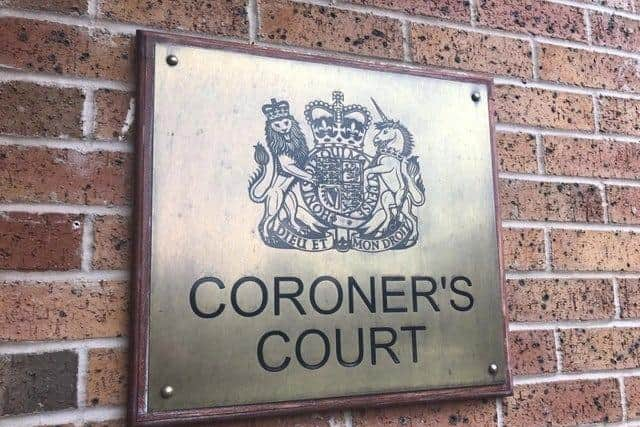'Much-loved' Derbyshire woman, aged 29, died after accidentally taking too much insulin
and live on Freeview channel 276
Sarah Rose Howsley, 29, passed away at Chesterfield Royal Hospital on October 14, 2021 having been admitted to intensive care on October 5.
An inquest into her death was held at Chesterfield Coroners Court on Thursday, August 10 and heard about the difficulties of self-managing diabetes.
Advertisement
Hide AdAdvertisement
Hide AdThe coroner, Sarah Huntbach, ruled that Sarah’s death was a tragic accident as a result of inadvertently taking too much prescribed insulin.


She was found, collapsed in her Matlock home, on the morning of October 5, 2021 by her mother Irene who had become “very concerned” after Sarah hadn’t answered the phone. The pair were due to meet that morning in Bakewell.
Sarah had only recently started a new job as a hotel housekeeper but was said to be “really enjoying” it and felt as though she had “finally found her niche”.
The 29-year-old had been diagnosed with diabetes in January 2015 and subsequently with epilepsy towards the beginning of the pandemic.
Advertisement
Hide AdAdvertisement
Hide AdIrene, Sarah’s mother, told the inquest there had been a number of incidents where Sarah had collapsed - at her home and in public - and this appeared to be unrelated to any hypoglycemic conditions.
She added that her daughter was ‘very happy in life’ and said: “She loved her home and she was happy there. (She) spent her summer seeing friends and family and then she started her new job in October.”
READ THIS: Man has skull rebuilt with plastic
But after being admitted to hospital on October 5 it was found that Sarah had five times the ‘normal’ level of insulin within her system. A blood sample was analysed and produced a reading of 83.2 - a ‘normal’ range would be expected as between six and 25, the inquest was told.
Evidence was heard from Dr Robert Robinson, general physician at Chesterfield Royal Hospital, who said he believed Sarah had likely passed out around 9pm on October 4 - around 12 hours before she was found by her mother.
Advertisement
Hide AdAdvertisement
Hide AdHe said: “I think she became incapacitated in the evening. She would then not have been able to give herself any more insulin. It suggests to me that Sarah had excessive insulin in her body - the most likely explanation is injected insulin. You cannot exclude other possibilities but that seems to me to be the most likely explanation.
“All I can say is what I think and I know it is very distressing but we can’t say what happened (with absolute certainty) but on the balance of probabilities.”
Sarah’s family said they believed she had collapsed in the morning - citing that ‘her alarm had been swiped off at 7am’, clothes folded on bed, and that her iPhone had recorded steps overnight. It was noted that the ‘steps’ could have been recorded from ‘seizure-like activity’.
Addressing the family, Dr Robinson said: “I do not want to discount what you’re saying. I can’t say that’s not right, I am just saying what I feel is most likely. But I do not want to argue with you, that is not my place.”
Advertisement
Hide AdAdvertisement
Hide AdHe added: “(Her blood sugar) was going down very quickly. She could have tried to treat it but it might have got on top of her, if you see what I mean? If I see that 2.3 going down I’m thinking that’s going to keep going down but I really don’t want to disagree or come into confrontation - this is a very tragic incident.”
Speaking more broadly, Dr Robinson sought to raise awareness of the difficulties in managing diabetes. He said: “A lot of people don’t understand that diabetes is actually a really really serious condition. If someone presents with leukemia or a similar condition you can choose to get treatment but treatment is very doctor led.
“The problem with diabetes is that (people with diabetes) have to self manage that. It is a very tough disease, it is a tough, tough disease to manage and people who don’t have diabetes, or don’t know someone with diabetes, simply don’t understand that. It is almost like groundhog day everyday.”
Sarah passed away on October 15, 2021 after results from an MRI scan showed “irreversible and unsurvivable” brain damage. A pathologist ruled that the brain damage was caused by hypoglycemic encephalopathy brought about by type one diabetes.
Advertisement
Hide AdAdvertisement
Hide AdAssistant coroner Susan Huntbach said: “It is clear to me that Irene had a good insight and understanding of Sarah’s medical condition. (Sarah) herself had an understanding of the medical condition and sort good management.
“She was organised and kept her night-time insulin by her bed. She also kept lucozade and dextrose by her bed should it be needed.”
Ms Huntbach found that, on the balance of probabilities, Sarah was likely to be tired from her new job and that this “affected her usually exemplary monitoring” and “in error took a higher dose of insulin”.
She echoed the remarks of Dr Robinson and said: “Diabetes is lifelong. I can’t even start to imagine what it must be like to lose someone so young, so early in her life, and someone to me who managed to cope with, what Dr Robinson described, is a tough disease. It’s just very sadly on this particular evening there was this unfortunate event that brought a very sad, tragic ending to her life.”
A conclusion of accidental death was recorded.